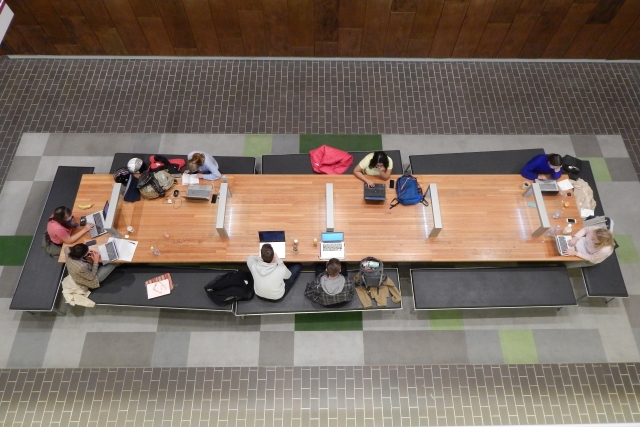I really needed to get out, says Valentina Bortolotti from Argentina. This first-year student in International Business Administration is studying with a fellow student from Uruguay, Valentina Cabrera, in the foyer of the Main Building. Laptops open, pen and paper next to them.
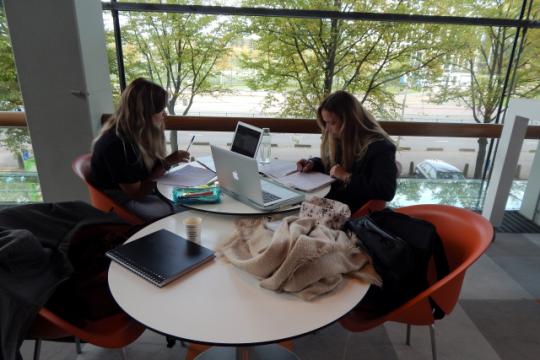
“University is really time-consuming”, zegt Cabrera (on the right in the photo). “We are studying at home, eating at home: we are at home all the time. Coming here gives some diversity.” They are currently working on a maths assignment. Bortolotti: “Usually we are with two other girls who speak Spanish. We help each other with the assignments. We don’t get distracted when we study here.”
There are others like Bortolotti and Cabrera. All the tables in the foyer area are occupied, downstairs in the central hall there is someone sitting on every sofa and at every table, and on the upper floors many rooms are occupied by one or two groups of people studying. Of course, you could not describe it as really busy – you don’t hear many voices and there are not many people walking around. But the seating areas of the main building are definitely full.
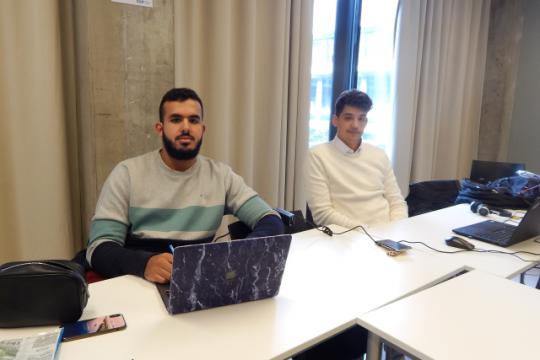
On the first floor, two friends are sitting in a room – Abdallah El Yamany and Ahmeddine Nekkaa. El Yamany is also studying International Business Administration (second year), and Nekkaa is not a student but is currently doing an internship at Pepsi Co. “Because of coronavirus, we have to work from home one day a week”, he says. “But my sisters are there too. That makes it hard to concentrate. And then he told me that this is good place to work.”
“It’s great for studying”, El Yamany agrees. “I can concentrate better here. When you’re at home you end up taking a nap. There are fewer distractions here. It’s great that we can grab our own room. And it’s nicer to be with friends.” He is preparing two presentations. “I’ll have to give them later”, he says. “On Zoom. I don’t have any classes on campus at all.”
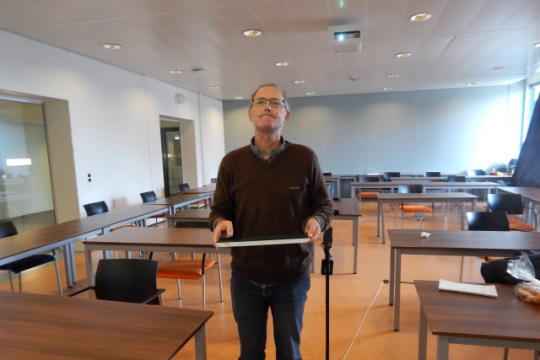
Organizational Scientist Sytze Kingma is preparing a room for a seminar on the sixth floor. The sign on the door says ‘Maximum 22 Students’. “It’s a hybrid seminar. That means that we are here in the room and people can also watch from home.”
He turns on the projector and the PC, places a flat round microphone on a table in the middle and adjusts the tripod for the camera. “It’s a hustle to stream online. And as a teacher, you don’t always know how to do things properly. Everyone has to be in shot and audible. And with a Zoom lesson, all the settings need to be right, otherwise it doesn’t work properly.”
‘People need to get to know each other before they can work together’
The question is how many of the 25 students will show up today. “Students say – well, if I can also follow online, do I really need to come to campus?” But Kingma thinks they should. “A seminar involves a lot of interaction. And it’s a big advantage if everyone is physically in the same room. People need to get to know each other before they can work together.”
He has five cancellations from students who are staying at home because they have coronavirus symptoms or are quarantining because of a sick roommate. “That’s twenty percent of the whole group! The virus is never far away. Some students are not sure whether they should come to campus or stay at home.”
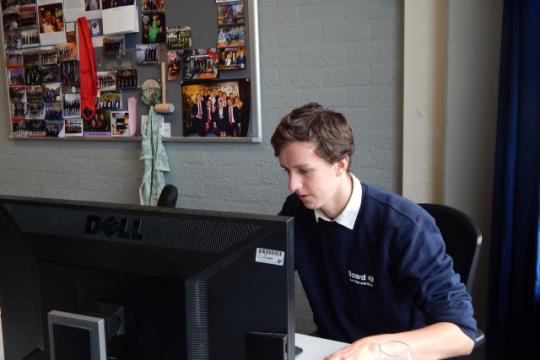
There’s music coming from the eighth floor. Ivo Warmerdam is sitting in the room that belongs to Kraket, the study association for econometrics. As the chairperson, he’s busy doing administrative work. “From time to time, the board members need to meet in order to take decisions.” The association has had to cancel many activities. “We’re currently working on an activity for first-year students focusing on how to prepare for the exam weeks. So we’re still making a contribution.”
He thinks that running a study association is more of a challenge under the present circumstances. “You’re learning to manage in a team during a very unusual period. The first-years aren’t having any physical classes at all at the moment. So as a study association, you have to prioritize this group of students. They’ve had such a weird time: they didn’t have an end-of-year trip or party when they left school, and they haven’t had an introduction week at university. Luckily a lot of people have volunteered to be mentors, so we’ve allocated them to groups of first-years. And we plan little things, like a treasure hunt and a boat trip.”
But things are very quiet. Warmerdam points out the empty swing seats at the association. “Normally it would be full of people playing games around here. The challenge of running the association is twice as big this year, and objectively it’s probably also less fun.”
